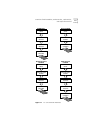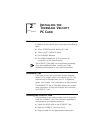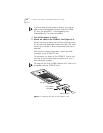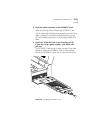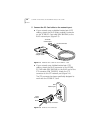
Socket Services
1-5
When configuring two or more PC Cards, you must
allocate memory and interrupt resources manually.
Socket Services
This is a BIOS-type interface that provides a way to gain
access to the PC Card sockets (slots) of a PC. It identifies
how many sockets your PC has and detects the insertion or
removal of a PC Card while the PC is switched on. It has
an interface to Card Services. Socket Services is part of the
PCMCIA Specification.
The Socket Services device driver is usually provided by
the manufacturer of the PC, because the driver must
understand the PC's BIOS and PCMCIA controller.
The Socket Services interface enabler shipped on
TokenDisk diskette #2 is TOKENRNG.EXE. It will not work
with Socket Services 2.0 or higher.
The file TOKENRNG.EXE is an MSDOS Socket Services 1.01
interface enabler. It uses the Socket Services that is
included in some PCs to configure the socket and PC Card.
It is used on machines with DATABOOK PC Card controllers
that support the Socket Services 1.01 interface and not
Card Services.
Card Services
This is a software management interface that allows
system resources (such as memory, interrupts, slots, and
I/O ports) to be allocated automatically when Socket
Services has detected that a PC Card has been inserted.
Client drivers call Card Services to allocate and de-allocate
system resources. When Socket Services detects an
insertion or removal of a PC Card, it sends notification to
Card Services. Card Services then notifies its registered
client drivers, such as IBMTOKCS.OS2, that they should
allocate or de-allocate resources.









